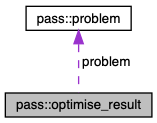#include <optimiser.hpp>
Created by optimiser::optimise. Stores information about the optimisation.
◆ optimise_result()
| pass::optimise_result::optimise_result |
( |
const pass::problem & |
problem, |
|
|
const double |
acceptable_fitness_value |
|
) |
| |
|
noexcept |
◆ agent()
| arma::vec pass::optimise_result::agent |
( |
| ) |
const |
Returns normalised_agent, but mapped to the search space of problem.
◆ solved()
| bool pass::optimise_result::solved |
( |
| ) |
const |
Returns true if the problem was solved i.e. if acceptable_fitness_value is reached.
◆ acceptable_fitness_value
| const double pass::optimise_result::acceptable_fitness_value |
The acceptable objective (good enough) value of the optimiser.
◆ duration
| std::chrono::nanoseconds pass::optimise_result::duration |
Total time in nanoseconds (10^-9) the optimiser took to find objective_value.
◆ evaluations
| arma::uword pass::optimise_result::evaluations |
◆ fitness_value
| double pass::optimise_result::fitness_value |
The best found objective value. Is initialised to + infinity.
◆ iterations
| arma::uword pass::optimise_result::iterations |
The number of iterations executed by the optimiser.
◆ normalised_agent
| arma::vec pass::optimise_result::normalised_agent |
The best found parameter that was evaluated to fitness_value. Is initialised to NaN in all dimensions. This vector is mapped to the range [0, 1] in all dimensions. To access the agent in problem search space coordinates, use optimise_result::agent().
◆ problem
The problem that was optimised.
The documentation for this struct was generated from the following files:



